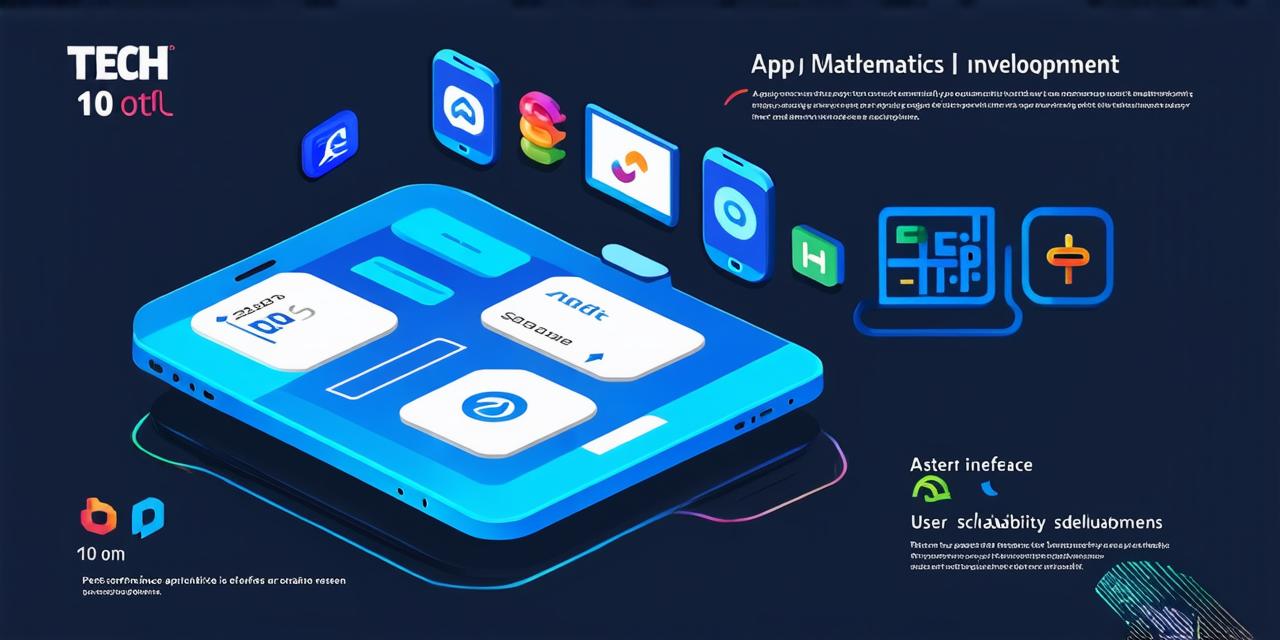Does creating apps involve mathematics?
When it comes to creating apps, there is a common misconception that math skills are not required. However, nothing could be further from the truth. In fact, mathematics plays a crucial role in app development, and without a solid understanding of mathematical concepts, an app developer may struggle to create a functional and successful app.
One of the key areas where math is used in app development is in user interface design. User interfaces (UIs) must be intuitive and easy to use, and this requires a deep understanding of mathematics. For example, when designing buttons and icons, developers need to consider the placement, size, and shape to make them easy to recognize and click.
In addition, mathematics is used in app development to ensure that the app runs smoothly and efficiently. This involves optimizing the code to minimize processing time and improve performance. Developers also need to consider the scalability of their app, which requires an understanding of mathematical concepts such as algorithms and data structures.
Moreover, mathematics is used in app development to create accurate and reliable calculations. Many apps require users to input numbers and perform mathematical operations, and developers need to ensure that these calculations are accurate and free from errors. This involves using mathematical formulas and equations to perform complex calculations quickly and accurately.
Despite the critical role of mathematics in app development, there is still a myth that math skills are not necessary for app developers. However, this simply cannot be true. In fact, without a solid understanding of mathematics, an app developer may struggle to create a functional and successful app.
Case Studies: Math in Action
One example of the critical role of math in app development can be seen in the development of the popular fitness app, MyFitnessPal. This app requires users to input their daily calorie intake, exercise, and other health-related data, which is then used to calculate their daily caloric needs and track their progress over time.
To create an accurate and reliable calculation system, MyFitnessPal developers used complex mathematical formulas and equations that take into account a wide range of factors, such as the user’s age, weight, activity level, and more. Without this understanding of mathematics, the app would not be able to provide users with accurate and actionable insights into their health and fitness progress.

Another example can be seen in the development of the popular navigation app, Google Maps. This app requires users to input their destination and current location, which is then used to calculate the most efficient route to their destination. To do this, Google Maps developers use complex algorithms that take into account factors such as traffic, road conditions, and distance between locations.
Without an understanding of mathematics, these algorithms would not be able to provide users with accurate and reliable navigation information, making it much more difficult for them to reach their destination on time.
Myth Busters: Debunking the Misconceptions
One common misconception is that math skills are only necessary for developers who specialize in certain areas of app development, such as UX design or performance optimization. However, this simply cannot be true. Math skills are essential for all areas of app development, from user interface design to data analysis and calculations.
Another myth is that math skills are only necessary for complex or scientific apps. While it is true that these apps may require a deeper understanding of mathematics, even the most basic apps can benefit from an understanding of mathematical concepts.
Furthermore, some people believe that math skills are only necessary for developers who have a degree in mathematics or a related field. However, this is not always the case. Many successful app developers come from diverse backgrounds and may not have a formal education in mathematics. What matters most is a strong understanding of mathematical concepts and how they can be applied to app development.
FAQs: Answering Your Questions
1. Do I need a degree in mathematics to become an app developer?
No, you do not need a degree in mathematics to become an app developer. However, a strong understanding of mathematical concepts and how they can be applied to app development is essential.
2. Is math only necessary for complex or scientific apps?
No, math skills are essential for all areas of app development, from user interface design to data analysis and calculations. Even the most basic apps can benefit from an understanding of mathematical concepts.
3. Can successful app developers come from diverse backgrounds and not have a formal education in mathematics?
Yes, many successful app developers come from diverse backgrounds and may not have a formal education in mathematics. What matters most is a strong understanding of mathematical concepts and how they can be applied to app development.
Summary: Math is Critical for App Development Success
In conclusion, math plays a critical role in app development, and without a solid understanding of mathematical concepts, an app developer may struggle to create a functional and successful app. From user interface design to data analysis and calculations, mathematics is essential for all areas of app development. By understanding the myths and misconceptions surrounding math in app development, developers can harness its power to create apps that are intuitive, efficient, and accurate.
If you’re an app developer looking to improve your skills and knowledge of mathematical concepts, there are many resources available online, including tutorials, courses, and forums. By investing in your education and staying up-to-date with the latest developments in mathematics and app development, you can position yourself for success and help ensure that your apps meet the high standards of quality and functionality that users expect.
